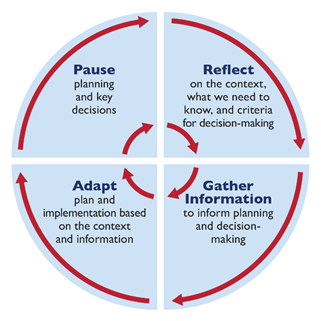 Given that development programs operate in complex and dynamic systems, donors and implementing organizations are increasingly seeking to create programs that are collaboratively designed, embed continual learning, and are adaptable. Collaborating, Learning, and Adapting (CLA) is USAID’s approach to becoming a more effective development organization as it can—
Given that development programs operate in complex and dynamic systems, donors and implementing organizations are increasingly seeking to create programs that are collaboratively designed, embed continual learning, and are adaptable. Collaborating, Learning, and Adapting (CLA) is USAID’s approach to becoming a more effective development organization as it can—
- reduce duplication and siloing
- base programs in evidence
- support adaptive course correction
USAID finds that a well-resourced and intentional approach to CLA can help contribute to improving organizational performance and development outcomes. While collaborating, learning, and adapting are familiar concepts, what is new is explicitly building in CLA principles and processes at the beginning of project design and implementation so that CLA activities support project efforts to achieve intended outcomes.
Collaboration
As USAID’s flagship multi-sectoral nutrition project, USAID Advancing Nutrition considers collaboration critical at both the project and activity levels. At the project level, there are staff who collaborate on multiple teams that share information across the project and bring diverse perspectives to issues. At the activity level, technical teams have identified and are engaging with key communities of practice/working groups in their respective areas to facilitate information-sharing and coordinate overlapping activities and mandates. The project also engages with non-governmental and governmental organizations to collaboratively design and implement activities.
Learning and adapting
At the overall project level, USAID Advancing Nutrition identifies time points within the annual planning and implementation cycle where it is critical to conduct learning activities that convene staff to pause and reflect and capture tacit knowledge in support of adaptive management decisions.
Key CLA Work to Date
Like all global development projects and activities, USAID Advancing Nutrition was caught off guard by COVID-19, which forced the project to quickly reassess and adapt programming as the pandemic spread across the globe. As the pandemic continues to evolve, the project identifies adaptations to intervention designs and will track adaptations of USAID-funded nutrition activities in response to COVID-19 and the outcomes. Learn more about Documenting COVID-19 Adaptations in USAID Nutrition Programs.
USAID Advancing Nutrition aims to generate global learning, evidence, and innovative practices on how to improve women’s diets, with a focus on pregnant and lactating women (PLW), to inform the design and implementation of nutrition programs and interventions. To do this, the project developed a Women’s Diets Learning Agenda to guide work planning and synthesis of evidence and learning on women’s diets across the project’s multi-sectoral portfolio.